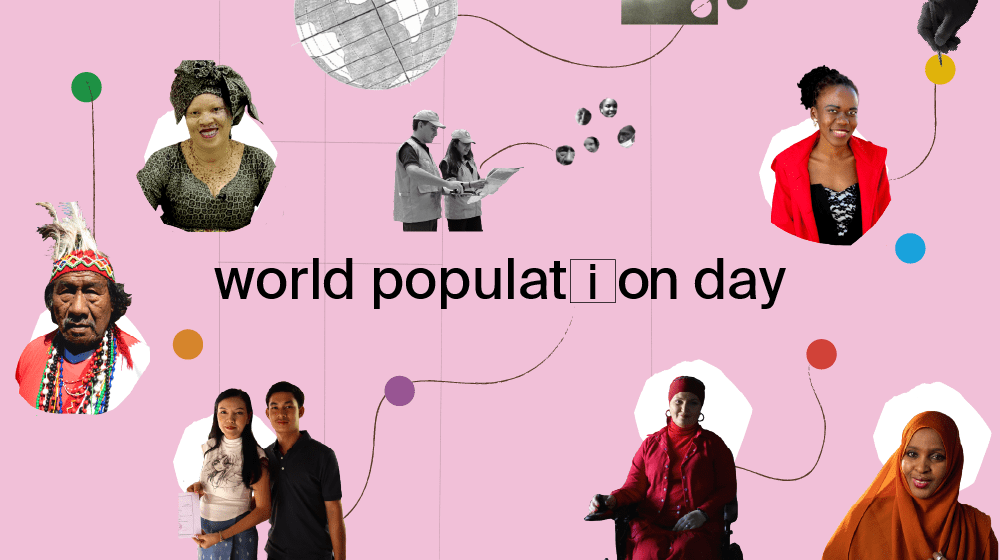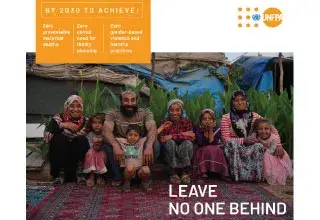Sweeping global gains in sexual and reproductive health and rights over the last thirty years are marred by an ugly truth: Millions of women and girls have not benefited because of who they are or where they were born. On July 11, World Population Day, the United Nations Population Fund (UNFPA) shows with its "2024 State of the World Population Report" that poverty, racism, sexism and other forms of discrimination augmented inequalities and left especially women and girls behind. According to the report, women and girls who are marginalized for various reasons or living in conflict and humanitarian crisis environments are much more likely to die due to lack of access to timely health care. The key to the solution is inclusive and reliable data.
ANKARA, TÜRKİYE - Over the past 30 years, global commitments to sexual and reproductive health and rights have made remarkable advances: More than 160 countries have passed laws against domestic violence, maternal mortality rates have dropped by almost a third, birth rates for girls in the ages of 15 to 19 have fallen by nearly a third. Data showcased these improvements while also exposing the gaps.
According to the United Nations Population Fund, UNFPA's 2024 State of World Population Report, the advantaged groups have enjoyed more from these advances, while millions of women and girls have not been able to benefit from the same improvements because of who they are or where they were born. In addition to powerful factors that disproportionately affect women, such as climate change, humanitarian crises and mass migration, women and girls who are marginalized due to poverty, discrimination based on race and ethnicity, and are living in conflict and humanitarian crisis environments continue to suffer and even lose their lives because of inequalities. According to UNFPA's new report;
What have we achieved?
- In the last 30 years, 162 countries have passed laws against domestic violence.
- Between 2000 and 2020, maternal mortality decreased by 34% globally.
- Since 2000, birth rates for girls between the ages of 15-19 have fallen by a third.
- Between 1990 and 2021, the number of women using modern contraceptives has doubled.
- The number of people diagnosed with HIV decreased by almost a third in 2021 compared to 2010.
What is missing?
- A quarter of women in 68 countries are still unable to make their own decisions about their health.
- Nearly 1 in 10 women cannot make their own decisions in using contraception.
- Within the 32 countries which have data, improvements are visible in women's bodily autonomy in 19 of them, while there are declines in 13 countries.
- A quarter of women cannot say no to sex with their partners and husbands.
- Nearly 800 women die everyday while giving birth: Almost all of these deaths are preventable. Most of these deaths occur in developing countries.
- Over half of all preventable maternal deaths are estimated to occur in countries with humanitarian crises and conflicts; that’s nearly 500 deaths per day.
- An African woman who experiences pregnancy and childbirth complications is around 130 times more likely to die than a woman in Europe and Northern America.
- Women with disabilities are up to 10 times more likely to experience gender-based violence than their peers without disabilities.
According to UNFPA's 2024 State of World Population report, spending an additional $79 billion on women’s health between the years of 2022 and 2050 can decrease maternal mortality by saving 1 million women from dying while generating $660 billion in economic benefits. Eliminating global gender inequality across the public, private and social sectors could contribute $12 trillion to global GDP. And ending intimate partner violence, which is believed to cost 5 percent of the world's GDP, could sustain its effects increasingly across generations by providing both short and long-term benefits in terms of productivity and earnings.
In order for these investments to be made in the right regions, for the right target groups; for ending inequalities to ensure that everyone can benefit from the progress made in women's rights and health; and for achieving demographic resilience, where everyone can enjoy equal rights and opportunities and live in prosperity, inclusive data is vital. Because data shows both the level of progress and the remaining gaps. Data demonstrates who is still going uncounted for, who is left behind, where they are, why and how they cannot benefit from the progress and what the solutions are. Reliable and comprehensive data also guides decision-makers to produce effective policies on demographic resilience, which is the basis of a sustainable and prosperous society. However;
- Fewer than 3 in 10 UN Member States have the data required to monitor Sustainable Development Goals progress for at least half of SDG indicators. SDG 5 (Gender equality) and SDG 13 (Climate) remain two of the goals for which we have the least available data.
- In the Americas, only 4 out of 35 countries identify the race or ethnicity of women who die in pregnancy or childbirth and only 11 collect maternal health data disaggregated by race.
- The world is not prioritizing data on the most vulnerable communities. For example, the places with the poorest data quality on adolescent mothers (ages 15-19) are the regions where adolescent childbirth is most common. Therefore, the policies produced on the issue are not being effective enough.
These important facts reveal how the inadequacy of data feeds inequalities. Because not being counted; means being made invisible and ultimately being unable to access services and rights. However, inclusive data provides effective and specific solutions. For humanity to progress, people should be counted as they are, in all their diversity, regardless of where and who they are. To end inequality, ensure peace and prosperity, and foster greater hope further, the world needs to work harder for inclusion.
Analysis suggests that every dollar invested in strengthening data systems generates $32 in economic benefits. To fully realize the potential benefits of population data, the United Nations recommends governments to increase domestic funding for data and statistics by 50 per cent by 2030.
Building more inclusive, resilient societies and systems and creating a peaceful and prosperous future in which rights and choices can be enjoyed by all is possible. This can only be achieved by counting people in all their diversity and including them as they are, while responding to their needs with effective policies by improved data collection and analysis.
You can read the full report in English here, The Turkish summary of the report is here, the English summary is here.




